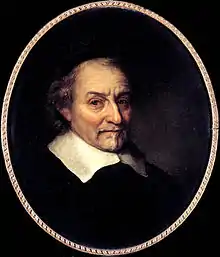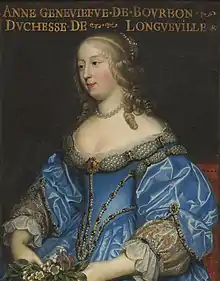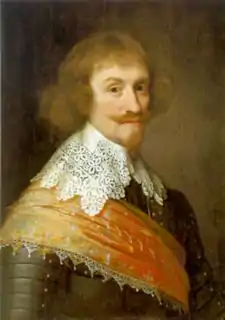1679
1679 (MDCLXXIX) was a common year starting on Sunday of the Gregorian calendar and a common year starting on Wednesday of the Julian calendar, the 1679th year of the Common Era (CE) and Anno Domini (AD) designations, the 679th year of the 2nd millennium, the 79th year of the 17th century, and the 10th and last year of the 1670s decade. As of the start of 1679, the Gregorian calendar was 10 days ahead of the Julian calendar, which remained in localized use until 1923.
| Millennium: | 2nd millennium |
|---|---|
| Centuries: | |
| Decades: | |
| Years: |
| 1679 by topic |
|---|
| Arts and science |
| Leaders |
| Birth and death categories |
| Births – Deaths |
| Establishments and disestablishments categories |
| Establishments – Disestablishments |
| Works category |
|
| Gregorian calendar | 1679 MDCLXXIX |
| Ab urbe condita | 2432 |
| Armenian calendar | 1128 ԹՎ ՌՃԻԸ |
| Assyrian calendar | 6429 |
| Balinese saka calendar | 1600–1601 |
| Bengali calendar | 1086 |
| Berber calendar | 2629 |
| English Regnal year | 30 Cha. 2 – 31 Cha. 2 |
| Buddhist calendar | 2223 |
| Burmese calendar | 1041 |
| Byzantine calendar | 7187–7188 |
| Chinese calendar | 戊午年 (Earth Horse) 4375 or 4315 — to — 己未年 (Earth Goat) 4376 or 4316 |
| Coptic calendar | 1395–1396 |
| Discordian calendar | 2845 |
| Ethiopian calendar | 1671–1672 |
| Hebrew calendar | 5439–5440 |
| Hindu calendars | |
| - Vikram Samvat | 1735–1736 |
| - Shaka Samvat | 1600–1601 |
| - Kali Yuga | 4779–4780 |
| Holocene calendar | 11679 |
| Igbo calendar | 679–680 |
| Iranian calendar | 1057–1058 |
| Islamic calendar | 1089–1090 |
| Japanese calendar | Enpō 7 (延宝7年) |
| Javanese calendar | 1601–1602 |
| Julian calendar | Gregorian minus 10 days |
| Korean calendar | 4012 |
| Minguo calendar | 233 before ROC 民前233年 |
| Nanakshahi calendar | 211 |
| Thai solar calendar | 2221–2222 |
| Tibetan calendar | 阳土马年 (male Earth-Horse) 1805 or 1424 or 652 — to — 阴土羊年 (female Earth-Goat) 1806 or 1425 or 653 |
| Wikimedia Commons has media related to 1679. |
Events
January–June
- January 24 – King Charles II of England dissolves the "Cavalier Parliament", after nearly 18 years.[1]
- March 6–May 27 – In England, the "Habeas Corpus Parliament" (or "First Exclusion Parliament") meets.[1] It is dissolved on July 12, while in recess, by royal prerogative, to prevent it from passing a bill excluding the king's brother, the Catholic James, Duke of York, from the succession to the English throne, as part of the Exclusion Crisis.
- May 27 – The Parliament of England passes the Habeas Corpus Act, "for the better securing the liberty of the subject".[1]
- June 1 – Battle of Drumclog: Scottish Covenanters defeat a small government force.
- June 4 – Armenia earthquake: A tremor with an estimated surface wave magnitude of 6.4 takes place, in the Yerevan region of the Persian Empire.
- June 22 – Battle of Bothwell Bridge, Scotland: Royal forces led by James Scott, 1st Duke of Monmouth and John Graham of Claverhouse subdue the Scottish Covenanters.
July–December
- August 7 – The brigantine Le Griffon, commissioned by René-Robert Cavelier, Sieur de La Salle, is towed to the southern end of the Niagara River, to become the first ship to sail the upper Great Lakes.
- September 2 – The 8.0 Mw Sanhe-Pinggu earthquake devastates Beijing and Hebei in China with a maximum Mercalli intensity of X ("Extreme").
- September 18 – New Hampshire becomes a county of the Massachusetts Bay Colony.
- November 27 – A fire in Boston, Massachusetts, burns all of the warehouses, 80 houses, and all of the ships in the dockyards.
Date unknown
- The Tibet–Ladakh–Mughal War (1679–84) begins with the Tibetan invasion of Ladakh.
- French explorer Daniel Greysolon, Sieur du Lhut, explores the Saint Louis River; the city of Duluth, Minnesota, will take its name from him.
- Mughal Emperor Aurangzeb reimposes jizya.
- Malpas Tunnel on the Canal du Midi in Hérault, France, Europe's first navigable canal tunnel, is excavated by Pierre-Paul Riquet (165 metres (541 ft), concrete lined).[2]
Births
- January 24 – Christian Wolff, German philosopher (d. 1754)
- March 18 – Matthew Decker, English merchant and writer (d. 1749)
- March 29 – Benedict Calvert, 4th Baron Baltimore, colonial governor of Maryland (d. 1715)
- May 29 – Antonio Farnese, Duke of Parma (d. 1731)
- August 16 – Catharine Trotter Cockburn, English novelist, dramatist, philosopher (d. 1749)
- August 22 – Pierre Guérin de Tencin, French cardinal (d. 1758)
- October 13 – Princess Magdalena Augusta of Anhalt-Zerbst, Duchess of Saxe-Gotha-Altenburg (d. 1740)
- October 16 – Jan Dismas Zelenka, Bohemian composer (d. 1745)
- October 18 – Ann Putnam, Jr., American accuser in the Salem witch trials (d. 1716)
- November 11 – Firmin Abauzit, French scientist (d. 1767)
- date unknown
- James Erskine, Lord Grange, Scottish judge (d. 1754)
- Francesco Zerafa, Maltese architect (d. 1758)
Deaths
- January 1 – Jan Steen, Dutch painter
- January 8 – Raymond Breton, French missionary (b. 1609)
- January 14 – Jacques de Billy, French Jesuit mathematician (b. 1602)
- January 15 – Pierre Lambert de la Motte, French bishop (b. 1624)
- January 24
- Ulderico Carpegna, Italian Catholic cardinal (b. 1595)
- Maurice Henry, Prince of Nassau-Hadamar (1653–1679) (b. 1626)
- January 29 – Carlo Ceresa, Italian painter (b. 1609)
- February 5 – Joost van den Vondel, Dutch dramatist and poet (b. 1587)
- February 6 – Margherita de' Medici, Italian duchess regent of Parma (b. 1612)
- February 18 – Lady Anne Finch Conway, English philosopher (b. 1631)
- February 19 – Henricus Regius, Dutch philosopher (b. 1598)
- February 19 – Thomas Hales, Connecticut settler (b. 1610)
- February 22 – Henrik Rysensteen, Dutch military engineer (b. 1624)
- March 11
- Sir John Covert, 1st Baronet, English politician (b. 1620)
- Luise Marie of the Palatinate, German princess (b. 1647)
- March 16
- John Leverett, Governor of the Massachusetts Bay Colony (b. 1616)
- Johan Frederik von Marschalck, German-born landowner, Chancellor of Norway (b. 1618)
- Johannes Schefferus, Alsatian-born humanist (b. 1621)
- March 27 – Abraham Mignon, Dutch golden age painter (b. 1640)
- April – Thomas Notley, Colonial governor of Maryland
- April 5 – Anne Geneviève de Bourbon, French princess and political activist (b. 1619)
- May 3 – James Sharp, Scottish archbishop (assassinated) (b. 1613)
- May 5 – Magnus Celsius, Swedish astronomer and mathematician (b. 1621)
- May 6 – Peregrine Hoby, English politician (b. 1602)
- May 10 – Dorothy, Lady Pakington, English religious writer (b. 1623)
- May 14 – August of Legnica, Silesian nobleman (b. 1627)
- May 26 – Ferdinand Maria, Elector of Bavaria (b. 1636)
- June 3 – Francisque Millet, Flemish-French painter (b. 1642)
- June 7 – Princess Christine Elisabeth of Schleswig-Holstein-Sonderburg, German noblewoman (b. 1638)
- June 15 – Guillaume Courtois, French painter (b. 1628)
- June 27 – Pablo Bruna, blind Spanish composer and organist (b. 1611)
- July 4 – Antoine Garaby de La Luzerne, French poet (b. 1617)
- July 11 – William Chamberlayne, English poet (b. 1619)
- July 19 – Francis Anderson, English politician (b. 1614)
- July 26 – Edward Bayntun, English politician (b. 1618)
- August – Catherine Lepère, French midwife (b. 1601)
- August 6 – John Snell, English royalist (b. 1629)
- August 12 – Marie de Rohan, French courtier and political activist (b. 1600)
- August 20 – Jacob Alting, Dutch linguist (b. 1618)
- August 24 – Jean François Paul de Gondi, Cardinal de Retz, French churchman and agitator (b. 1614)
- August 28 – Alfonso Litta, Cardinal, Archbishop of Milan (b. 1608)
- August 29 – Margaret Mostyn, English Carmelite nun (b. 1625)
- September 9 – John Gurdon, English politician (b. 1595)
- September 11 – Nicolaes Visscher I (buried), Dutch engraver, cartographer and publisher (b. 1618)
- September 17 – John of Austria the Younger, Spanish general (b. 1629)
- September 25 – Philips Augustijn Immenraet, Flemish painter (b. 1627)
- September 29 – John Manners, 8th Earl of Rutland, English politician when he inherited the peerage (b. 1604)
- October 1 – Antonia of Württemberg, princess, literary figure, patron, and Christian Kabbalist (b. 1613)
- October 2 – Sir William Bowyer, 1st Baronet, English politician (b. 1612)
- October 3 – Hugh Bethell, English Member of Parliament and High Sheriff (b. 1615)
- October 12 – William Gurnall, English writer (b. 1617)
- October 26 – Roger Boyle, 1st Earl of Orrery, British soldier, statesman, and dramatist (b. 1621)
- November 11 – Rosina Schnorr, German businessperson (b. 1618)
- November 19 – Roger Conant Massachusetts governor, founder of Salem, Massachusetts (b. 1592)
- November 27 – Archibald Primrose, Lord Carrington, Scottish judge (b. 1616)
- December 4 – Thomas Hobbes, English philosopher (b. 1588)
- December 10 – Francesco Barberini, Italian Catholic cardinal (b. 1597)
- December 20 – John Maurice, Prince of Nassau-Siegen (b. 1604)
- December 18 – John Frederick, Duke of Brunswick-Lüneburg, Duke of Brunswick-Calenberg (1665–1679) (b. 1625)
- December 21 – Claude Lamoral, 3rd Prince of Ligne, Spanish general and prince (b. 1618)
- December 28
- Peder Winstrup, Bishop of Lund (b. 1605)
- Andrzej Trzebicki, nobleman and priest in the Polish-Lithuanian Commonwealth (b. 1607)
- December 31 – Giovanni Alfonso Borelli, Italian physiologist and physicist (b. 1608)
References
- Williams, Hywel (2005). Cassell's Chronology of World History. London: Weidenfeld & Nicolson. pp. 278–279. ISBN 0-304-35730-8.
- Roland, Claudine (1997). The Canal du Midi. MSM. ISBN 2-909998-66-5.
This article is issued from Wikipedia. The text is licensed under Creative Commons - Attribution - Sharealike. Additional terms may apply for the media files.




_by_Cornelis_Jonson_van_Ceulen_(1593-1661).jpg.webp)
.jpg.webp)

